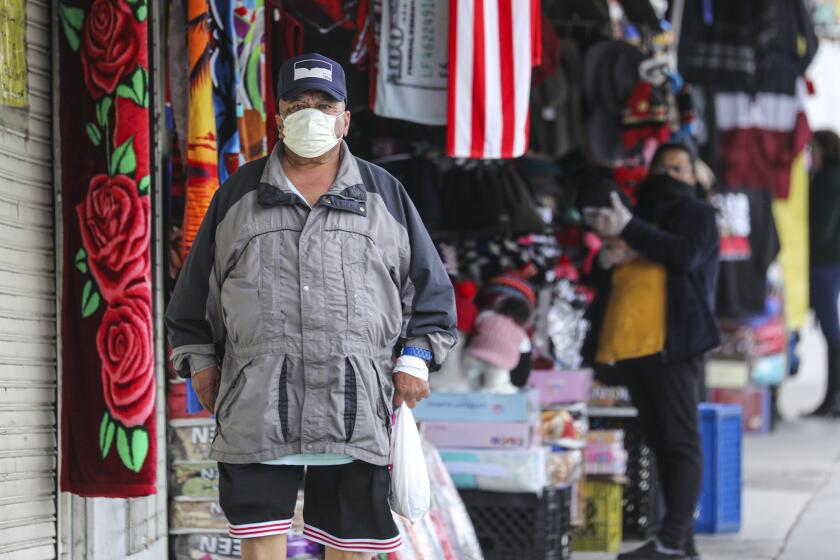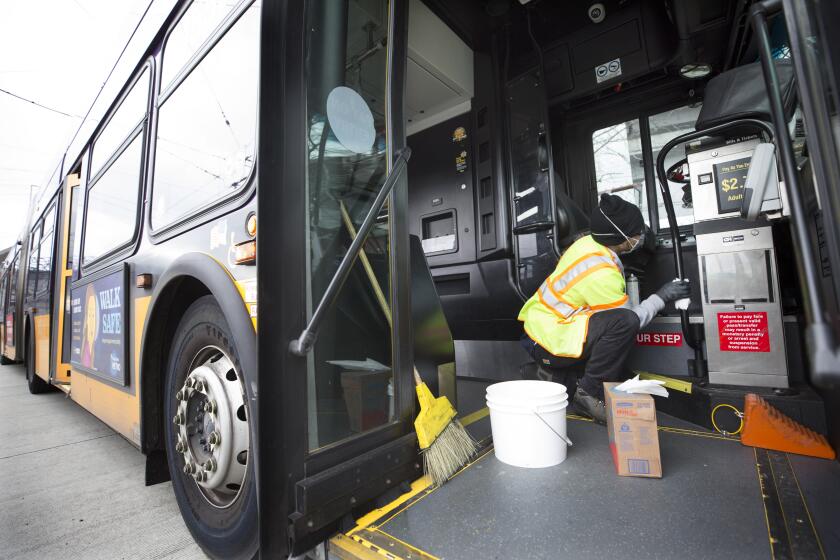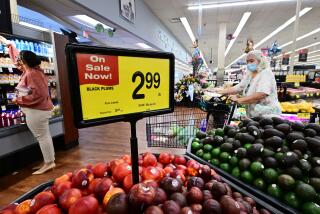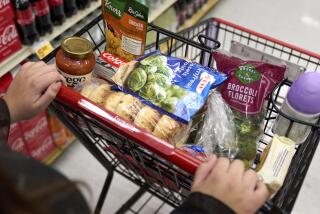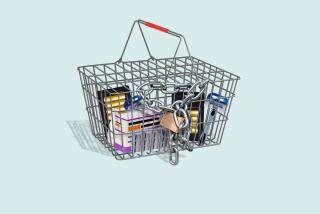Sales are up at supermarkets. But that brings new problems for the grocery industry
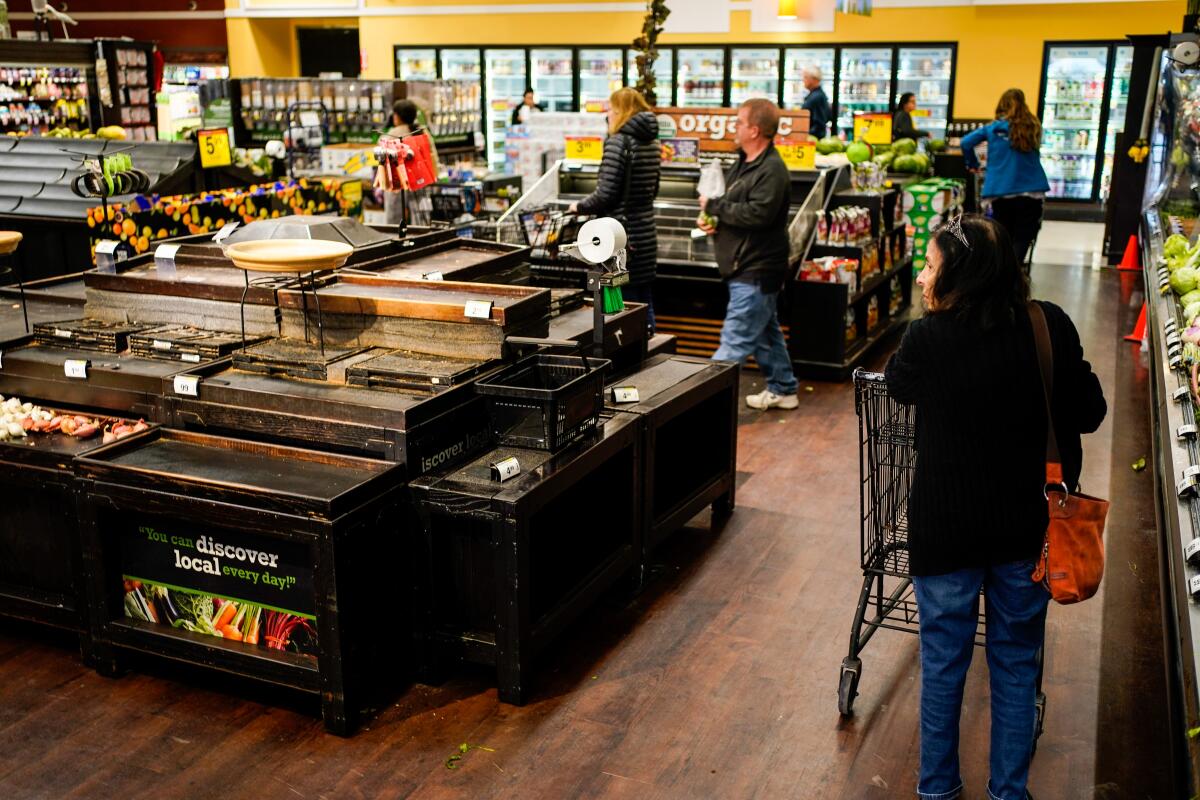
There can be such a thing as too much business, supermarkets across the country are realizing as the surge in grocery demand sparked by the widening coronavirus crisis is forcing them to modify their policies.
The rush of shoppers has helped grocers’ stock prices as much of the market has been hammered. But it has also strained supply chains, resulting in picked-over shelves, long lines, harried staff and reduced hours — leaving supermarkets the most visible symbol for many Americans of the macro and microeconomic consequences of the outbreak.
And with officials in Los Angeles and across the country beginning to order or recommend that restaurants halt dine-in service or restrict capacity, the pressure on supermarkets will probably increase.
Major grocery chains such as Walmart, Stater Bros. and a number of Kroger subsidiaries, including Ralphs, are halting 24-hour operations to allow extra time for their workers to clean, sanitize and restock stores.
The new hours vary from chain to chain: Ralphs is reducing its hours to 8 a.m. to 8 p.m., Stater Bros. is reducing to 8 a.m. to 9 p.m., and Walmart is reducing hours nationwide to 6 a.m. to 11 p.m.
John Votava, director of corporate affairs at Ralphs, said the move will allow the company to “really sanitize the store ... restock, and it also gives us time to balance the needs of our associates.”
The frenzy at stores has helped publicly traded companies, such as Walmart, Costco and Kroger, outperform the volatile market. The S&P 500 index has slid 28% since Feb. 21, while Costco only lost 12% of its share value. Walmart lost nearly 10%, and Kroger managed to tick up 2.6%.
The ramp-up to the virus-related demand was captured in Costco’s most recent earnings report, which showed a 13% uptick in February sales compared with last year. Other companies are forecasting strong revenues as shoppers stock up.
But in the aisles and at the loading docks, workers and managers are struggling to withstand the new pressures, and some fear that staffing will become an issue as the virus spreads and schools continue to shut down, forcing more workers to stay home.
This comes as household staples such as hand sanitizer and toilet paper remain in short supply at many grocers. Industry experts say there’s little risk of out-and-out food shortages across the country — right now the issue is one of distribution, as demand spikes.
The major chains usually get shipments overnight, or perhaps twice a day, to restock essentials such as paper towels, toilet paper and water, but “manufacturers in some cases are having trouble keeping up, and that’s where the void is, they’re not able to keep up with demand,” said Bob Reeves, vice president for the West at the Shelby Report, a research firm that tracks the grocery industry.
“We’re seeing shipments coming into the stores sometimes without any of those products, and it will be like that until people calm down a little bit,” he said.
“We’re refilling high-demand products as quickly as we can,” Vivek Sankaran, chief executive of Albertsons Cos., which also owns Vons and Pavilions, said in a note to customers Friday.
Get the latest coronavirus updates from our staff in California and around the world.
In some cases, chains are sending their delivery trucks directly to manufacturers — bypassing warehouses and distributors — to get the items to the stores faster, said Burt P. Flickinger III, managing director of the retail consultant Strategic Resource Group.
But that still hasn’t been enough to satisfy demand, as the empty shelves attest, Flickinger said.
“This is a crisis of unprecedented proportions” compared with disruptions caused by hurricanes and other natural disasters, where “it’s a week or a few weeks and then things get back to normal,” he said, adding that it could be several weeks before conditions improve.
Some chains are limiting the number of certain items each customer can buy with each visit, but “that’s hard to manage in many cases because they don’t want to upset their customers,” Reeves said.
Rodney McMullen, chief executive of Kroger Co., the parent of Ralphs and other chains, said in an email to customers Wednesday that the company’s “supply chain teams are working to ensure that the food, medicine and cleaning supplies our customers need are reaching our stores as quickly as possible.”
Reeves said another potential problem for the chains is that they could find their staffing levels strained either because an increasing number of schools are temporarily closing, leaving children at home and forcing parents to stay with them, or because workers are becoming ill.
How the coronavirus outbreak might affect you or your family depends heavily on where you work and live and the generosity of your employer’s benefits.
“Not everybody can afford to have day care,” Reeves said. “I’m not aware of any staffing issues currently, but that’s going to become a bigger problem.”
Albertsons spokeswoman Melissa Hill said in an email that the chain was “not experiencing problems with staffing but are always looking for people to fill positions, and there is certainly a need in the stores right now.”
Further up the supply chain, industry groups say that there’s no current shortage of food in the pipeline — after all, U.S. consumers aren’t eating more overall, they’re just buying their food all at once — but that might change if coronavirus outbreaks start to affect workers in food production and distribution.
The National Pork Producers Council has sent a letter to the White House and federal legislators, warning that the spreading virus could make the industry’s ongoing labor crisis worse, resulting in “serious market disruption with catastrophic implications for hog farmers.” The group urged lawmakers to offer farmers financial support and expedite worker visas to avoid shortages.
The Consumer Brands Assn., the industry group representing most major packaged goods companies in the U.S., is asking lawmakers to raise the number of hours that truck drivers are allowed to drive from 11 to 13 to deal with increased demand, and is pushing for expedited approval processes for consumer goods at ports and stricter enforcement of anti-price gouging laws.
In China, the original epicenter of the coronavirus outbreak, national food production and distribution have been stretched thin by the scale of sickness and the intensity of the government response, which saw cities and provinces shut down for weeks to try to slow the spread of the disease.
To keep supplies flowing into the most severely affected city of Wuhan and its surrounding province, Hubei, the Chinese Ministry of Agriculture ordered the farm industry to increase production “by every possible means” while keeping prices stable. By early March, officials said that they had amassed a 60,000-ton vegetable reserve near Hubei and a 10,000-ton pork reserve near the port of Shanghai.
Officials in Italy announced a national lockdown last week as the number of diagnosed COVID-19 cases climbed over 12,000 and the death toll from the virus ticked past 800. When the northern regions of Lombardy and Veneto were locked down earlier in March, reporters found that local production of iconic artisanal foods, such as wine and gorgonzola cheese, was grinding to a halt. But even as bars, restaurants and shops close down to weather the crisis, food stores, pharmacies, and stores selling other essential items have been kept open, and there have been no reports of basic food shortages to date.
